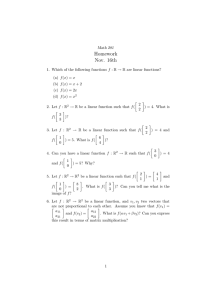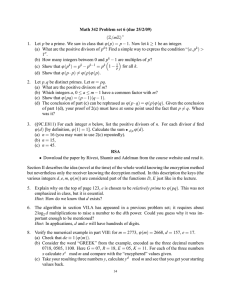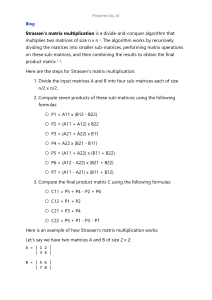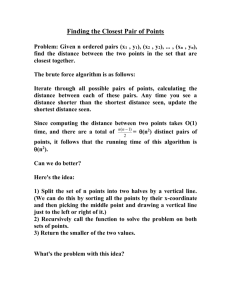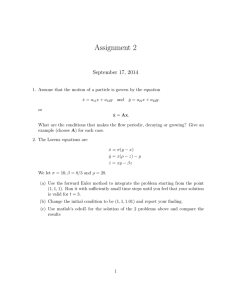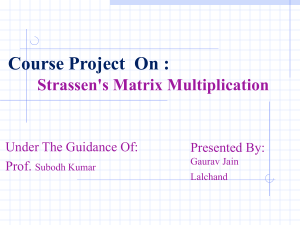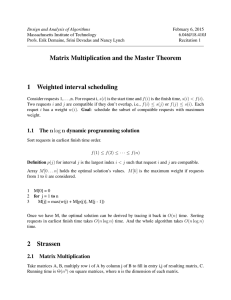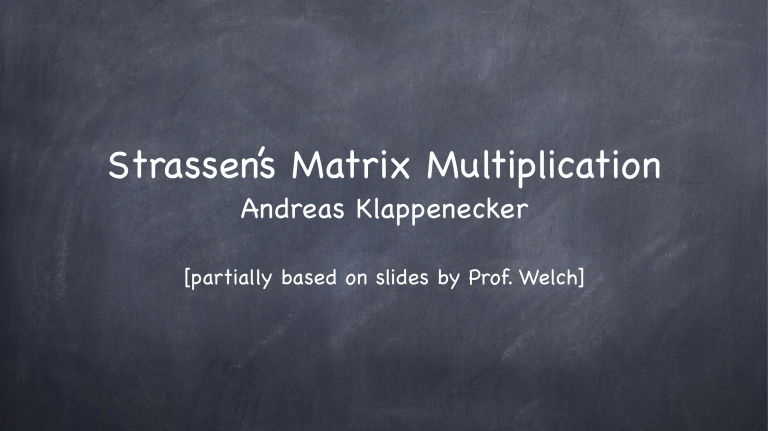
Strassen’s Matrix Multiplication Andreas Klappenecker [partially based on slides by Prof. Welch] Matrix Multiplication Consider two n x n matrices A and B Recall that the matrix product C = AB of two n x n matrices is defined as the n x n matrix that has the coefficient ckl = ∑m akm bml in row k and column l, where the sum ranges over the integers from 1 to n; the scalar product of the kth row of a with the lth column of B. The straightforward algorithm uses O(n3) scalar operations. Can we do better? Idea: Use Divide and Conquer The divide and conquer paradigm is important general technique for designing algorithms. In general, it follows the steps: - divide the problem into subproblems - recursively solve the subproblems - combine solutions to subproblems to get solution to original problem Divide-and-Conquer Let write the product A B = C as follows: A0 A1 A2 A3 × B0 B1 B2 B3 = A0×B0+A1×B2 A0×B1+A1×B3 A2×B0+A3×B2 A2×B1+A3×B3 • Divide matrices A and B into four submatrices each • We have 8 smaller matrix multiplications and 4 additions. Is it faster? Divide-and-Conquer Let us investigate this recursive version of the matrix multiplication. Since we divide A, B and C into 4 submatrices each, we can compute the resulting matrix C by • 8 matrix multiplications on the submatrices of A and B, • plus Θ(n2) scalar operations Divide-and-Conquer • Running time of recursive version of straightfoward algorithm is T(n) = 8T(n/2) + Θ(n2) and T(2) = Θ(1) where T(n) is running time on an n x n matrix • Master theorem gives us: T(n) = Θ(n3) • Can we do fewer recursive calls (fewer multiplications of the n/2 x n/2 submatrices)? Strassen’s Matrix Multiplication A A11 A12 A21 A22 × × B = B11 B12 B21 B22 P1 = (A11+ A22)(B11+B22) P2 = (A21 + A22) * B11 P3 = A11 * (B12 - B22) P4 = A22 * (B21 - B11) P5 = (A11 + A12) * B22 P6 = (A21 - A11) * (B11 + B12) P7 = (A12 - A22) * (B21 + B22) = C . C11 C12 C21 C22 C11 = P1 + P4 - P5 + P7 C12 = P3 + P5 C21 = P2 + P4 C22 = P1 + P3 - P2 + P6 Strassen's Matrix Multiplication • Strassen found a way to get all the required information with only 7 matrix multiplications, instead of 8. • Recurrence for new algorithm is • T(n) = 7T(n/2) + Θ(n2) Solving the Recurrence Relation Applying the Master Theorem to T(n) = a T(n/b) + f(n) with a=7, b=2, and f(n)=Θ(n2). Since f(n) = O(nlogb(a)-ε) = O(nlog2(7)-ε), case a) applies and we get T(n)= Θ(nlogb(a)) = Θ(nlog2(7)) = O(n2.81). Discussion of Strassen's Algorithm • Not always practical • constant factor is larger than for naïve method • specially designed methods are better on sparse matrices • issues of numerical (in)stability • recursion uses lots of space • Not the fastest known method • Fastest known is O(n2.3727) [Winograd-Coppersmith algorithm improved by V. Williams] • Best known lower bound is Ω(n2)
